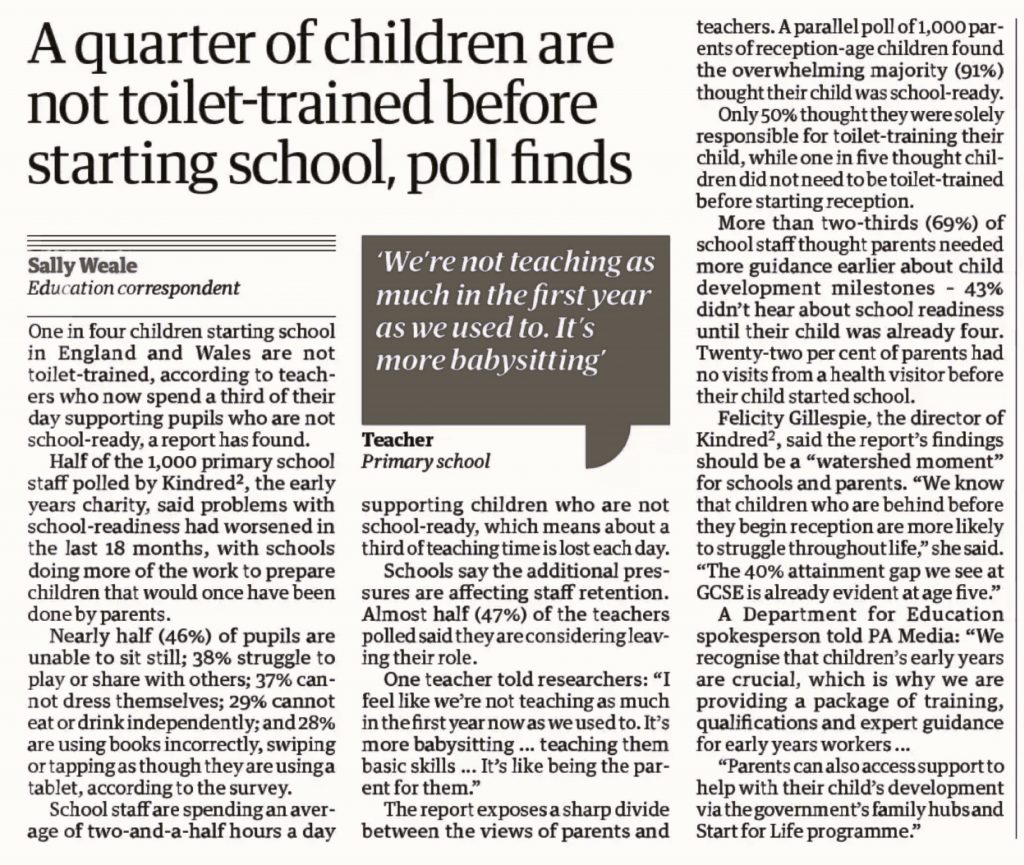There was a short, eye-opening article in The Guardian yesterday.

Kindred2 commissioned the survey from Savanta. Their full report is here, and a summary infographic is here. It’s a large sample size, with the opinions being gathered from focus groups and surveys of 1000 parents of Reception age children, and 1000 school staff (including 491 primary school teachers, 68 Reception teachers, 66 members of primary school senior leadership teams, and 368 teaching assistants).
The survey shows that there’s a big contrast in perception, between teachers and families, about which party should ultimately be responsible for ensuring the child’s development in relation to core skills such as attention control, social interaction, language, and self care skills (i.e., dressing, feeding and toileting). The level of disconnect between schools and parents is worrying. The implied level of disconnect between parents and their children (with everyone on their devices, instead of reading and playing), as noted by the teachers, is even more worrying.
Since we’re likely to see a change in government in the relatively near future, I was interested to hear what MPs have to say on the topic. Kindred2 have looked into this as well – they delivered a similar poll to a representative sample of 100 MPs the last time they did this annual survey. The report is here, but I’ve extracted the data for Labour and Conservative MPs as follows:
Two things strike me:
- If the Conservatives are so certain that families should take primary responsibility in these areas, why have they done so little to assist them in the last 14 years?
- If Labour think it’s right that schools should shoulder proportionately more responsibility in these areas, they had better be planning to find some money to support them to do so.
There used to be a clear message from nurseries, schools and Health Visitors to parents about what was expected of them, and what ‘school readiness’ meant. Cuts and shifting priorities have washed all of that away – parents aren’t getting guidance or support in anything like a timely manner. At a community level, our ambition for our children seems to be at an all time low, and buck-passing is the only way people can cope with the demands of daily life – families and schools alike.
Who even knows what school readiness means now? Statutory school age is the first term after a child’s fifth birthday, but essentially 100% of children attend Reception in the year before this, starting the first September after their fourth birthday. (Reception provision was doubled to 30 hours a week in September 2017). Six-hour days have proven to be overwhelming for many four-year-olds, particularly summer-born children. Parents have a right to access these hours of ‘childcare’ though, and the child’s level of readiness for the experience isn’t a part of the discussion.
Furthermore, with the increasing levels of delay and disorder that we are seeing in reception intakes, it’s less reasonable for a setting to make blanket demands regarding readiness. Inclusion is the order of the day, but the child’s experience has ultimately been forgotten.
Part of the answer is investment. I hope that Labour are ready to make a statement here. Schools need a lot more teaching staff, and a higher quality of training for these staff. Money is needed to bring back universal Health Visiting. Children’s centres need to be reimagined and funded all over again. We need more Nursery Nurses, working in bustling, interdisciplinary Child Development Centres. Families need to actually be able to access SALT and other forms of early intervention. Professionals need to think about the messages we want to deliver to parents (e.g., about child development, about interaction and about screen-time) and we need to deliver them effectively.
Early years provision has to be reconsidered too. Schools tell me that they’ve had to completely reshape their provisions, in Year 1 and even in Year 2, in order to meet the developmental needs of their children, who have missed so much over covid. Does it still make sense to have discrete year groups, with expectations ratcheting up with each transition, when children often aren’t ready to move up? The simple answer is that childcare and educational provisions up to the age of 7 need to be arranged by developmental level, not by chronological age.


